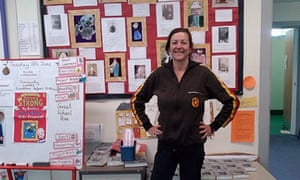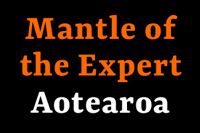Imaginative inquiry has transformed my job
Here’s a story I only just spotted from the GUARDIAN in 2013. Great advocacy from a teacher in the UK who discovered Mantle of the Expert (which she calls Imaginative Inquiry) and now uses it regularly in her junior classroom. I particularly like how Jenny links Mantle of the Expert to Philosophy for children and dialogic pedagogy. The story was written by Emily Drabble and first published Sun 7 Jul 2013 07.00 BST Click here for link to the original story.
After drifting through her first few years of teaching, Jenny Lewis was put on an inspiring professional development programme that sparked a passion for creative approaches to learning

Both my parents were teachers and they advised me not to go into teaching. I did a degree in English literature at Goldsmiths University then worked for a few years in shops and offices. I didn’t really have a clue what I was doing. Then I decided to do a PGCE at Goldsmiths, not because I had any burning ambition – just because I wanted a career. I worked in two inner city schools in London, first South Haringay Infants school then Allen Edwards primary school. I loved the kids and the challenge and of course teaching is always more than a job, but I didn’t have a clear vision about what learning should be about or what I believed teaching was.
I moved to Oxford and got a job in another inner city multicultural school called East Oxford First school. It was here I started finding myself as a teacher. I had a fantastic head and we had challenging children from complex social circumstances. We had to work so closely with families as many of them were refugees and travellers – and we needed to create a really nurturing environment and our biggest drive was to help children be receptive to learning even with such complicated home lives. I became part of the leadership team and I started to get more emotionally involved with teaching.
But it was when I moved to Norwich that everything really started to change for me. I started teaching at Avenue First School which is now part of Recreation Road primary. Our head Serena Dixon is incredible and she’s changed my life in so many ways. She finds and nurtures talent in people and I can’t overstate the massive impact she has had on me as a person and a teacher. It was really at this point that I began to learn a lot more about pedagogy, about how children learn and think, rather than just delivering the curriculum.
At that time Norfolk Education Authority had this incredible programme: Thinking Schools, Thinking Children. Serena Dixon was really keen to get involved and it was the start of a really inspirational few years that Norfolk schools are still benefitting from today.
The real revelations were using philosophy and drama for learning. We got to hear amazing inspirational speakers including Barry Hymer and Sir John Jones – speakers who have had a real impact on education and made me think about what learning is about. So suddenly all this opened up to me.
The best thing about the programme for me was that it was based on action research so we would go back and try things out in our classes, it was a really reflective process.
We found that using philosophy for children (P4C) and creating a dialogic classroom was right for our school. Robin Alexander from Cambridge University taught me so much about using talk in the classroom and creating a real co-constructed learning environment – so instead of a teacher imparting knowledge by asking questions it’s more about being a facilitator in the classroom and getting high-level dialogue and a higher-order of conversation.
Then in 2004 I went to hear a speaker called Luke Abbott talk about imaginative inquiry. I was completely intrigued by what he had to say about the Mantle of the Expert (MoE) pedagogy, a drama-based learning where the children learn in an imaginary world in role. That was the day that my teaching life took an incredible turn.
It seemed such an exciting way for me to move forward as a practitioner so I was thrilled to become part of a project that trained me in the use of MoE. Since then I have worked with a group of colleagues who have become a committed and transforming support group and who are still helping me to refine and improve my practice and understanding of the approach.
I have run a series of long term MoE contexts with my classes, while developing imaginative-inquiry as a pedagogic approach that we use throughout the school.
My current year 2 children are a group of curators creating a museum about a workhouse. We have co-created the story of the Baxter family who entered the workhouse in 1835. As museum creators in 2013 we examine these fictional historical documents to piece together information. We co-create the whole world and the class’ job to go in and turn the classroom into a museum. They partly work in the present and partly in the 19th century in a process (rather than a performance) drama.
We spend around half our time in school fully in role. It’s a very deep way of working. You can cover most of the curriculum within the imaginary world.
The children absolutely love it and speaking and listening skills go through the roof. Because the world is co-created and the pupils lead the story they have a huge ownership of it. They have so many ideas and have a really big say over their learning. Children come in with ideas and as a teacher you weave them into the drama. When you start there’s a lot of learn, it’s a complex pedagogy.
Now we use MoE across the school, as well as the forest school approach and P4C. There is nothing fluffy about it. We are an Ofsted outstanding school. Our data holds up, we have strong academic achievement.
Working like this takes a lot of time, you aren’t dusting down old plans, you’re being constantly creative. But it’s such a lot of fun. I compare it to being in an amazing film. We all become very emotional at this time of year when the film is about to end, it’s really hard to say goodbye to these year long projects.
Thanks to Jenny for sharing these Fictional historical documents which are part of her year 2 class’s MoE co-created story of the Baxter family who entered the workhouse in 1835.
Jenny Lewis teachers at Recreation Road Infant school in Norwich. Jenny is also involved in training and supporting other teachers in Norfolk and beyond.
Topics

Leave a Reply
Want to join the discussion?Feel free to contribute!